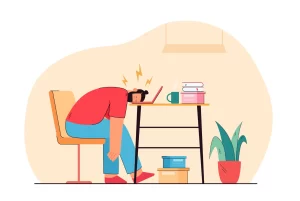 In our fast-paced world, burnout has become an all-too-common issue that affects people across various professions and life stages. But what exactly is burnout, and how can you recognize its signs?
In our fast-paced world, burnout has become an all-too-common issue that affects people across various professions and life stages. But what exactly is burnout, and how can you recognize its signs?
Today, we’ll delve into the concept of burnout, identify its signs, and explore strategies to avoid it.
Understanding Burnout
Burnout is more than just feeling tired or stressed; it’s a specific type of work-related stress that results from chronic exhaustion, cynicism, and a reduced sense of accomplishment. Here’s what you need to know:
1. Chronic Exhaustion
Burnout often begins with persistent feelings of physical and emotional exhaustion. You may feel drained, tired, and unable to recharge even after a good night’s sleep or a vacation.
2. Cynicism and Detachment
As burnout progresses, you may become increasingly cynical and detached from your work or daily life. You might find yourself distancing from colleagues, losing interest in tasks, or feeling emotionally disconnected.
3. Reduced Accomplishment
Burnout can lead to feelings of inefficacy and reduced productivity. Tasks that were once manageable may now seem insurmountable, and you might doubt your abilities and achievements.
Signs of Burnout
Recognizing the signs of burnout early is crucial for addressing it effectively:
1. Physical Symptoms
- Chronic fatigue
- Headaches or muscle pain
- Sleep disturbances
- Frequent illnesses
2. Emotional Signs
- Increased irritability
- Anxiety or depression
- Decreased motivation
- Feeling overwhelmed
3. Behavioral Indicators
- Isolating from others
- Neglecting responsibilities
- Using unhealthy coping mechanisms
- Procrastination or absenteeism
How to Avoid Burnout
Preventing burnout requires proactive self-care and stress management:
1. Set Boundaries
Establish clear boundaries between work and personal life. Avoid overextending yourself and prioritize downtime.
2. Practice Stress Management
Incorporate stress-relief techniques into your daily routine, such as meditation, exercise, or mindfulness.
3. Seek Support
Talk to friends, family, or a mental health professional if you’re experiencing burnout symptoms. Sharing your feelings can provide valuable emotional support.
4. Time Management
Organize your tasks and set realistic goals. Break large projects into smaller, manageable steps to avoid feeling overwhelmed.
5. Take Breaks
Regular breaks, even short ones, can help refresh your mind and prevent burnout. Don’t forget to use your vacation time.
Burnout is a serious issue that can have detrimental effects on your physical and mental health, as well as your overall quality of life. By understanding the signs of burnout and implementing preventive measures like setting boundaries, managing stress, seeking support, and practicing time management, you can protect yourself from its harmful effects and maintain a healthier work-life balance. Remember that self-care is essential, and it’s okay to prioritize your well-being.
Picture Credit: Freepik
